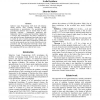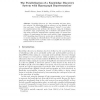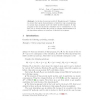AIMSA
2000
Springer
15 years 6 months ago
2000
Springer
Inductive Logic Programming (ILP) deals with inducing clausal theories from examples basically through generalization or specialization. The specialization and generalization oper...
138
click to vote
IPPS
2000
IEEE
15 years 6 months ago
2000
IEEE
Abstract. Knowledge discovery is a time-consuming and space intensive endeavor. By distributing such an endeavor, we can diminish both time and space. System INDED
pronounced indee...
137
click to vote
ILP
2001
Springer
15 years 6 months ago
2001
Springer
In the line of previous work by S. Muggleton and C. Sakama, we extend the logical characterization of inductive logic programming, to normal logic programs under the stable models ...
122
click to vote
GECCO
2003
Springer
15 years 7 months ago
2003
Springer
Over the last few years, a few approaches have been proposed aiming to combine genetic and evolutionary computation (GECCO) with inductive logic programming (ILP). The underlying r...
124
click to vote
ILP
2004
Springer
15 years 7 months ago
2004
Springer
Many domains in the field of Inductive Logic Programming (ILP) involve highly unbalanced data. Our research has focused on Information Extraction (IE), a task that typically invol...
129
click to vote
IEAAIE
2004
Springer
15 years 7 months ago
2004
Springer
Learning systems have been devised as a way of overcoming the knowledge acquisition bottleneck in the development of knowledge-based systems. They often cast learning to a search p...
103
click to vote
ECAI
2004
Springer
15 years 7 months ago
2004
Springer
Learning general truths from the observation of simple domains and, further, learning how to use this knowledge are essential capabilities for any intelligent agent to understand ...
126
click to vote
ILP
2005
Springer
15 years 7 months ago
2005
Springer
We propose a new approach to Inductive Logic Programming that systematically exploits caching and offers a number of advantages over current systems. It avoids redundant computati...
ILP
2005
Springer
15 years 7 months ago
2005
Springer
Abstract. It is well known by Inductive Logic Programming (ILP) practioners that ILP systems usually take a long time to find valuable models (theories). The problem is specially ...
112
click to vote
ECML
2005
Springer
15 years 7 months ago
2005
Springer
Abstract. Learning from multi-relational domains has gained increasing attention over the past few years. Inductive logic programming (ILP) systems, which often rely on hill-climbi...



